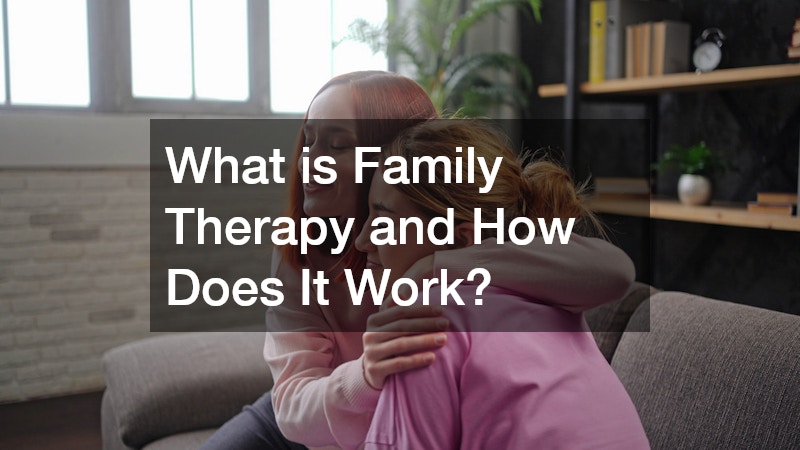In today’s fast-paced world, families face numerous challenges that can strain relationships and create misunderstandings. Family therapy serves as a valuable resource for addressing these issues, offering a structured environment to resolve conflicts and improve communication. By engaging in family therapy, families can enhance their dynamics, creating a supportive and harmonious home atmosphere.
What is Family Therapy and How Does It Work?
At its core, family therapy is built on principles of systemic thinking, where the family is viewed as a complex unit rather than a collection of individuals. The primary focus is on understanding patterns and interactions within the family system to identify and address dysfunctional behaviors.
Techniques used in family therapy include conflict resolution strategies, communication exercises, and cognitive-behavioral methods tailored to family needs.
Family therapy sessions are typically collaborative, involving all family members to participate actively in the healing process. Therapists work to create a safe and open environment where members feel heard and validated. This holistic approach allows the therapist to address issues such as parenting challenges, sibling rivalry, or behavioral problems in children.
The effectiveness of family therapy often lies in its adaptability, as therapists can employ various methods tailored to each family’s unique situation. Whether dealing with substance abuse, mental health issues, or life transitions, family therapy offers a comprehensive framework. Research indicates that families who engage in therapy are more likely to develop healthier communication patterns and effective problem-solving skills.
A family therapist acts as a guide, helping families navigate the complexities of personal relationships and conflicts. They are trained to observe family interactions and identify patterns that may contribute to issues. The therapist’s responsibility is to facilitate dialogue, promote understanding, and support families in developing constructive solutions.
In sessions, the therapist aims to create an empathetic and nonjudgmental space where family members can express concerns and feelings honestly. To achieve this, they may use various therapeutic models, such as structural, strategic, or narrative therapy. The therapist’s goal is to empower families to make meaningful changes that improve interpersonal relationships and overall family dynamics.
Moreover, family therapists employ active listening techniques, encouraging each member to voice their perspectives. By fostering an environment of respect and empathy, therapists help break down barriers that hinder communication. This collaborative and inclusive approach enhances the therapeutic experience and allows for deep, transformative work.
Why Should You Consider Family Therapy?
Family therapy offers a range of benefits that extend beyond addressing immediate conflict, significantly contributing to the emotional health of participants. By recognizing and validating each member’s feelings, therapy sessions promote emotional resilience and understanding. This process supports the development of healthier emotional responses and coping strategies for stressful situations.
Through therapy, families can explore deep-seated patterns of behavior and emotional dynamics that may have contributed to longstanding issues. This awareness leads to increased empathy and compassion among family members, fostering a more supportive environment. Emotional healing within the family system can have a positive ripple effect, improving individual mental health and well-being.
The therapeutic process emphasizes the importance of emotional expression and effective communication, enabling families to better navigate future challenges. Engaging in family therapy can lead to reduced anxiety, depression, and other stress-related symptoms. Overall, the process helps in building a foundation of trust and emotional safety where all family members can thrive.
How to Get the Most Out of Family Therapy?
To maximize the benefits of family therapy, it is crucial to set realistic and attainable goals. By defining clear objectives, families can focus their efforts on specific areas that require attention. These goals provide a roadmap for therapy, allowing progress to be tracked and celebrated along the way.
Realistic goals should reflect the needs and capacities of the entire family, encouraging cooperation and commitment. Achievable goals also contribute to a sense of accomplishment and motivation, maintaining engagement in the therapeutic process. Families are encouraged to revisit and adjust their goals as therapy progresses, ensuring alignment with evolving needs.
Establishing shared goals fosters unity and a collaborative approach, promoting healing and growth. Additionally, goal-setting empowers families to take ownership of the therapeutic journey, enhancing their investment and participation. Over time, these efforts contribute to lasting improvements in family relationships and dynamics.
Family therapy offers transformative potential for resolving conflicts and enhancing family life. By promoting improved communication, emotional health, and strong family bonds, therapy equips families with essential tools for navigating life’s challenges. Embracing family therapy can lead to not only resolving existing issues but also fostering a thriving, supportive family environment.


